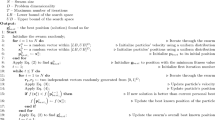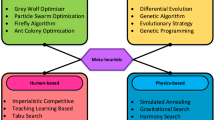Abstract
Since its invention, Particle Swarm Optimization (PSO) has received significant attention in the optimization community, which spawned numerous PSO modifications, variations and applications. However, most of the PSO improvements come with impaired simplicity and increased computational cost of the method. As an effort to advance the PSO performance through enhanced particle awareness of its own fitness, a novel PSO modification based on personal fitness improvement dependent inertia (PFIDI) is proposed. The PFIDI technique used in the paper employs a straightforward and elegant switch-like condition on inertia which turns off a particle’s inertia when the particle stops advancing in a direction of better fitness. Considering the effects of this technique on the particle movement logic, the method is called “Languid PSO” (LPSO). So as to attain a reliable assessment of the effects of PFIDI as implemented in LPSO, a massive computing effort was exerted for the benchmark testing, in which LPSO accuracy was compared to standard PSO accuracy on 30 test functions (CEC 2014 test suite), three problem space dimensionalities (10, 20 and 50), and a wide range of PSO parameters. The results clearly show the advantages of PFIDI-enabled LPSO, which predominantly outperforms standard PSO, both across all parameter combinations and for best-achieving PSO parameters. The success of the proposed PSO modification, coupled with its elegance and computational simplicity (less than 1.1 % increase in computational cost over standard PSO), indicates that fitness-based inertia may represent a rewarding approach in the PSO research.






Similar content being viewed by others
References
Bansal J, Singh P, Saraswat M, Verma A, Jadon SS, Abraham A (2011) Inertia weight strategies in particle swarm optimization. In: Nature and Biologically Inspired Computing (NaBIC), 2011 Third World Congress on, pp 633–640. IEEE
Braendler D, Hendtlass T (2002) The suitability of particle swarm optimisation for training neural hardware. In: Hendtlass T, Ali M (eds) Developments in Applied Artificial Intelligence, vol 2358., Lecture Notes in Computer ScienceSpringer, Berlin, pp 190–199. doi:10.1007/3-540-48035-8_19
Bratton D, Kennedy J (2007) Defining a standard for particle swarm optimization. In: Swarm Intelligence Symposium. SIS 2007. IEEE, pp 120–127
Cai X, Cui Z, Zeng J, Tan Y (2007) Performance-dependent adaptive particle swarm optimization. Int J Innov Comput Inform Control 3(6 B):1697–1706
Clerc M (2001) Think locally, act locally: the way of life of cheap-pso, an adaptive pso. Technical Report. http://clerc.maurice.free.fr/pso
Clerc M (2012) Standard particle swarm optimisation from 2006 to 2011. http://clerc.maurice.free.fr/pso/SPSO_descriptions.pdf
Deep K, Arya M, Bansal JC (2011) A non-deterministic adaptive inertia weight in pso. In: Proceedings of the 13th annual conference on Genetic and evolutionary computation, GECCO ’11, pp 1155–1162. ACM, New York, NY, USA. doi:10.1145/2001576.2001732
Dong C, Wang G, Chen Z, Yu Z (2008) A method of self-adaptive inertia weight for pso. In: Computer Science and Software Engineering, 2008 International Conference on, vol 1, pp 1195–1198. doi:10.1109/CSSE.2008.295
Eberhart R, Kennedy J (1995) A new optimizer using particle swarm theory. In: Micro Machine and Human Science, 1995. MHS’95. In: Proceedings of the Sixth International Symposium on, pp 39–43. IEEE
Feng C, Cong S, Feng X (2007) A new adaptive inertia weight strategy in particle swarm optimization. In: Evolutionary Computation, 2007. CEC 2007. IEEE Congress on, pp 4186–4190. IEEE
Kennedy J, Eberhart R (1995) Particle swarm optimisation. 1995. In: Proceedings IEEE International Conference on Neural Networks, vol IV, pp 1942–1948. IEEE Service Center, Piscataway
Liang J, Qu B, Suganthan P (2013) Problem definitions and evaluation criteria for the CEC 2014 special session and competition on single objective real-parameter numerical optimization. Zhengzhou University, Zhengzhou China and Technical Report, Nanyang Technological University, Singapore, Computational Intelligence Laboratory
Liu B, Wang L, Jin YH, Tang F, Huang DX (2005) Improved particle swarm optimization combined with chaos. Chaos Solitons Fractals 25(5):1261–1271
PSC: Particle swarm central, standard PSO 2006 (2006). http://www.particleswarm.info/Standard_PSO_2006.c
Rada-Vilela J, Johnston M, Zhang M (2015) Population statistics for particle swarm optimization: Single-evaluation methods in noisy optimization problems. Soft Comput 19(9):2691–2716. doi:10.1007/s00500-014-1438-y
Raghavendra R, Dorizzi B (2011) A novel adaptive inertia particle swarm optimization (aipso) algorithm for improving multimodal biometric recognition. In: Hand-Based Biometrics (ICHB), 2011 International Conference on, pp 1–6. doi:10.1109/ICHB.2011.6094299
Rezazadeh I, Meybodi MR, Naebi A (2011) Adaptive particle swarm optimization algorithm for dynamic environments. In: Tan Y, Shi Y, Chai Y, Wang G (eds) Advances in swarm intelligence, pp 120–129. Springer, Heidelberg
Shi Y, Eberhart R (1998) A modified particle swarm optimizer. In: Evolutionary Computation Proceedings, 1998. IEEE World Congress on Computational Intelligence, The 1998 IEEE International Conference on, pp 69–73. IEEE
Shi Y, Eberhart R (2001) Fuzzy adaptive particle swarm optimization. In: Evolutionary Computation, 2001. Proceedings of the 2001 Congress on, vol 1, pp 101–106. doi:10.1109/CEC.2001.934377
Suresh K, Ghosh S, Kundu D, Sen A, Das S, Abraham A (2008) Inertia-adaptive particle swarm optimizer for improved global search. In: Intelligent Systems Design and Applications, 2008. ISDA’08. Eighth International Conference on, vol 2, pp 253–258. IEEE
van den Bergh F (2002) An analysis of particle swarm optimizers. Ph.D. thesis, University of Pretoria, Pretoria
Veeramachaneni K, Peram T, Mohan C, Osadciw LA (2003) Optimization using particle swarms with near neighbor interactions. In: Proceedings of the 2003 international conference on Genetic and evolutionary computation: PartI, GECCO’03, pp 110–121. Springer-Verlag, Berlin, Heidelberg. http://dl.acm.org/citation.cfm?id=1761233.1761244
Yang X, Yuan J, Yuan J, Mao H (2007) A modified particle swarm optimizer with dynamic adaptation. Appl Math Comput 189(2):1205–1213
Zhang X, Du Y, Qin G (2005) Adaptive particle swarm algorithm with dynamically changing inertia weight. J Xian Jiaotong Univ 39:1039–1042
Author information
Authors and Affiliations
Corresponding author
Ethics declarations
Conflict of interest
The authors declare that there is no conflict of interest regarding the publication of this paper.
Additional information
Communicated by V. Loia.
Rights and permissions
About this article
Cite this article
Družeta, S., Ivić, S. Examination of benefits of personal fitness improvement dependent inertia for Particle Swarm Optimization. Soft Comput 21, 3387–3400 (2017). https://doi.org/10.1007/s00500-015-2016-7
Published:
Issue Date:
DOI: https://doi.org/10.1007/s00500-015-2016-7




